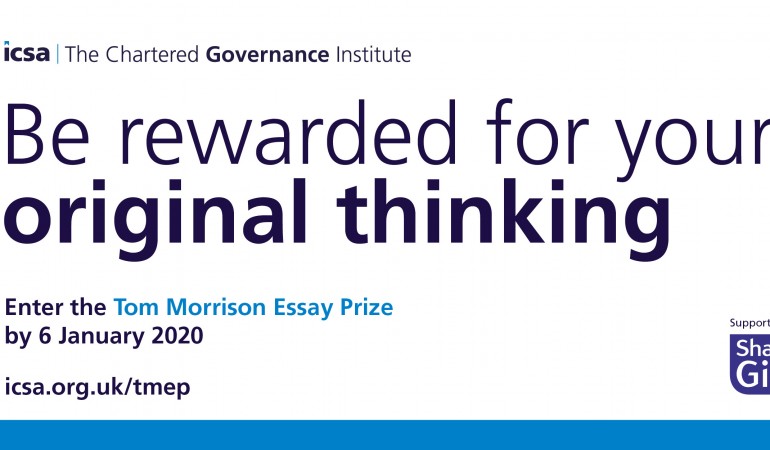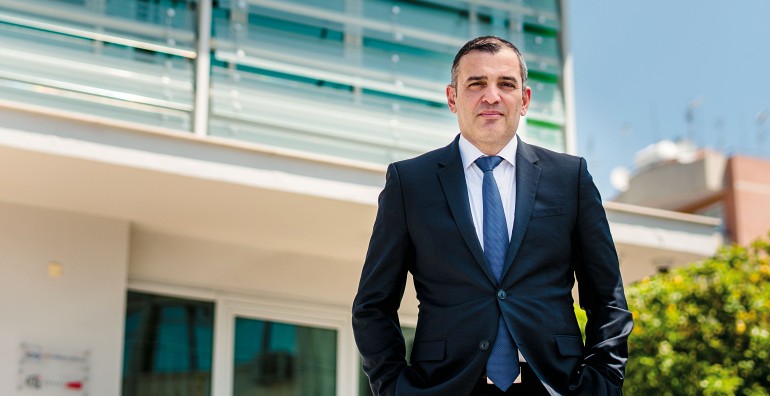Take part in ICSA’s Tom Morrison Essay Prize competition, initiated and supported by ShareGift, to be in with a chance of winning £1000 (first prize) or £500 (runner-up prize).
Open to students, recent graduates or governance professionals at the start of their career, the Tom Morrison Essay Prize encourages new thinking and recognises original approaches to governance.
Essays of 2,000-2,500 words that demonstrate original thinking about key aspects of governance are sought by the 6 January 2020 deadline, on the following topic:
Could organisations more proactively address environmental, social and governance issues before being required to do so by regulation? How might this be achieved and what do you see as the role of the governance professional?
All entries must be word processed rather than handwritten and submitted in PDF format.
About
Tom Morrison, who died in 2014, was an active member and ex-President of ICSA and a leading light in ICSA’s Registrar Group. A highly regarded and influential member of the share registration industry, Tom was an early supporter of the unique work of ShareGift, the charity which instigated the prize and which made a generous donation to The Chartered Secretaries’ Charitable Trust in order to establish it and fund the prizes.
Governance professionals worldwide are increasingly called upon to help organisations perform optimally and to achieve sustainability. The Tom Morrison Essay Prize encourages new thinking and recognises original approaches to governance.
Winning will give you recognition among your peers as a thought leader and impress your boss and future employers. You will also be financially better off. There is a top prize of £1000 and a runner-up prize of £500.
If you need help with your entry or require any clarification, please contact Maria Brookes on +44 (0)20 7612 7072 or via email [email protected].
Entry Information
- All essays must address the proposed question.
- Entry to the competition is only open to students (ICSA or other), recent graduates or governance professionals with a maximum of two years’ experience in a governance role.
- All entries must be written in English.
- Essays should be 2,000-2,500 words in length, with 2,500 being the maximum number of words that will be accepted.
- All entries must be word processed and submitted electronically.
- All prizes are awarded based on the decision of an independent panel of judges.
- Entries will be judged anonymously, with no indication within the essay of the author’s name, employer’s business or place of work.
- There are no geographical restrictions regarding entries. Governance professionals or students from any country can enter.
- A statement of originality is mandatory.
- All entries will be subject to a plagiarism check. Essays where clear evidence of plagiarism is found will be disqualified.
- The judges’ decision is final, no correspondence will be entered into and no reasons given for decisions.
- Judges will absent themselves from any discussions where they have a vested interest.
- ICSA reserves the right to publish in full or in part all winning essays and will own the copyright for all winning essays.
- The winners will be notified of their win by the end of April 2020.
Judging criteria
Essays will be judged on:
- The originality of the ideas it contains and the impact it might have on governance – at an organisational, national or international level.
- The extent to which it challenges conventional thinking and approaches or incorporates principles or practices from other fields.
The judges will also take into account:
- Clarity of expression, including logical flow of content.
- Correct use of the English language, including spelling and punctuation.
- Correct use of referencing and or acknowledgement of material drawn from other sources.
Guidance
When writing your essay, you might like to consider the following:
- What explicit assumptions am I making? Can they be challenged?
- What implicit/taken-for-granted assumptions am I making? Can they be challenged?
- How logical is my reasoning?
- How sound is the evidence for my assertion(s)?
- Whose interests and what interests are served by my assertions?
- What values underpin my reasoning?
- What are the implications of my conclusions?
- What meaning is conveyed by the terminology employed and the language used?
- What alternative conclusions can be drawn from the evidence?
Previous winners
2019
Essay question:
In an increasingly automated world, robotics, AI* and other technological advancements are expected to have an impact on governance. Consider the opportunities, challenges, benefits and risks that such technologies might bring to the role of the company secretary.
FIRST PLACE – LEONORA RAE
The winner of the 2019 Tom Morrison Essay Prize met the brief by looking at the role of the company secretary in a holistic manner, dividing the position into two categories. The first being to consider the intangible elements of the position, and the second being the social conscience of the organisation. In her essay, Leonora analysed minute taking, shareholder engagement, board automation and emotional intelligence. Read the essay here.
SECOND PLACE – HARRY MATTHEWS
The 2019 runner-up explored how technology has aided the evolution of the company secretarial role to encompass a wider range of duties. In his essay, Harry examined the benefits, opportunities, risks and threats of technological advancements on the profession in the context of their impact on governance. Read the essay here.
NB: The opinions expressed represent the writers' own views and not necessarily those of their employers
*Artificial intelligence
2018
2018 essay question
‘It has been said that governance failures usually happen within the subsidiary structure of a large business, but all governance focus tends to be at the main board level. Is the focus on the right area and, if not, what improvements could be made?’
First place – Elizabeth Colvin
The winner of the 2018 Tom Morrison Essay Prize met the brief by considering whether a main board centric approach to corporate governance is appropriate in a landscape that comprises a wide variety of legal entities. In her essay, Elizabeth considered culture and ethics and deliberated if existing corporate governance codes are dealing with subsidiary governance properly. Finally, she reviewed a number of measures that could be implemented or extended to improve governance at a subsidiary level. Read the essay here.
Second place – Indira Ramkissoon-Rambharose
The 2018 runner-up focused on the ethical aspect of governance success. Indira’s essay sought to illustrate that what occurs below board level and within the subsidiaries is equally important as what happens at board level. She explored the idea that an ethical framework constitutes the epicentre of successful business governance as it goes beyond the gaps left by legal provisions. Read the essay here.
2017
2017 essay question
‘The Annual General Meeting is an important governance process for the members of an organisation. It can ensure transparency, provide updates and give members an opportunity to vote on a range of matters. New meeting technology and virtual attendance products offer the potential to change the format of the AGM. With particular reference to governance, discuss the relevance, future development and challenges of the AGM.’
First place - Dr Rhona Sim
The winner of the 2017 Tom Morrison Essay Prize met the brief in challenging conventional thinking, looking widely at the organisational and international aspects of the AGM and its role in corporate governance. Although acknowledging the potential offered by new technology and electronic participation in the AGM, the essay focused on the substantive issues of meeting the UK Corporate Governance Code’s emphasis on ensuring accountability – with particular emphasis on the election of directors, the role of board evaluations and executive remuneration policies. Read the essay here.
Second place - Nicholas Cottrell
The 2017 runner-up explored the difficulties inherent in the current format of the AGM, particularly with the low degree of shareholder engagement. The essay examined the potential of using technology to run ‘virtual’ AGMs and questioned the extent to which this would improve accountability and transparency before concluding that the future might lie in holding ‘hybrid’ AGMs, combining traditional physical meetings with additional online access.
Read the essay here.
2016
2016 essay question
‘Does good governance require a fresh approach?’
First place – Ruth Keating
The 2016 winning essay took a broad overview of corporate governance, exploring examples of failed corporate governance and attributing these failures to an absence of belief in the true value of corporate governance, and a reliance on adhering to systems of rules. Significantly, and very relevant to the competition, Ruth argues that good corporate governance should “reduce corporate arrogance by encouraging the views of dissenters!” She concludes that corporate governance could and should do better, by ceasing to be a formality and becoming a way of business life.
The judges admired the way Ruth identified the problems, acknowledged the importance of culture and behaviour, suggested a solution and presented her essay as an enjoyable and thought-provoking piece of work. Read the essay here.
Second place – Rebecca Keating
Ruth’s twin sister Rebecca’s essay focused on the impact of new technology on corporate governance, dealing with concerns about cyber security and the paradoxical situation that occurs when engaged and collaborative employees are increasingly the custodians of corporate data - but at the same time become points of vulnerability in terms of data leakage, whether that leakage happens through negligence or malicious cyber-attack. Rebecca’s essay explores these questions and concludes that 21st century corporate governance must address data security in a collaborative way that involves not only a few key stakeholders at the top of organisations but each and every employee.
The judges agreed that this essay tackled a specific governance issue in depth, that it took a fresh approach to the topic and was of practical significance to organisations.
Read the essay here.
Supporters
ShareGift
Tom was an early supporter of the unique work of ShareGift, the share donation charity, which instigated the Tom Morrison Essay Prize and made an initial donation to The Chartered Secretaries’ Charitable Trust in order to establish it and fund the prizes.
Computershare
Tom was a much loved employee of Computershare, which has hosted a dinner for the winners of the Tom Morrison Essay Prize for the past few years. Tom joined Computershare in 1998 when Computershare acquired the Royal Bank of Scotland Registrars business. Recognised for his major contribution to making the acquisition a success and, as Chief Registrar, for being a senior steward in leading the UK share registration business forward, Tom is widely remembered for his significant contributions to the development of the UK securities industry.
Acknowledged to be one of the "fathers of CREST", for his efforts to guide and assist the development and successful introduction of the CREST settlement system, Tom also helped shape industry policy and UK corporate law. In 2012 Tom was given an Outstanding Achievement Award by ICSA to a standing ovation.






